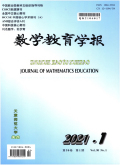数学教育学报2024,Vol.33Issue(2):27-33,97,8.
初中生数学成绩及个体因素影响机制的性别差异
Gender Differences in Mathematics Achievement of Junior High School Students and the Influencing Mechanism of Individual Factors
摘要
Abstract
Based on the monitoring data of the academic quality of junior high school students in S city,this study conducts an in-depth exploration of the differences and reasons between male and female students in mathematics learning under the current school educational conditions.The results of the study show that:overall,girls in primary and junior high schools lag behind boys in mathematics achievement,and the gap between boys and girls at the end of the second year of junior high school is smaller than that at the end of primary school graduation;compared with boys,girls at the 4~42 quantile have achieved better development in junior high school;compared with girls,boys achieve better academic performance in difficult topics;girls in the lower group have significantly higher mathematics scores than boys,but girls in the middle and high groups have significantly lower mathematics scores than boys.The co-influence of the dominant variables(study input,etc.)for girls in the lower group on mathematics performance is greater than the co-influence of the dominant variables(interest in mathematics learning,etc.)for boys,which can explain partially that the girls have higher scores than boys;the co-influence of the dominant variables(study input,etc.)for girls in the middle and high groups is smaller than the co-influence of the dominant variables(interest in mathematics learning,etc.)for boys,which can explain partially that the girls have lower scores than boys.关键词
性别差异/数学成绩/个体因素/学业质量监测Key words
gender difference/mathematics achievement/individual factors/academic quality monitoring分类
社会科学引用本文复制引用
罗强,于飞飞..初中生数学成绩及个体因素影响机制的性别差异[J].数学教育学报,2024,33(2):27-33,97,8.基金项目
江苏省教育科学"十三五"规划重点自筹课题——基于监测大数据的区域教育质量提升路径研究(E-b/2020/16) (E-b/2020/16)

